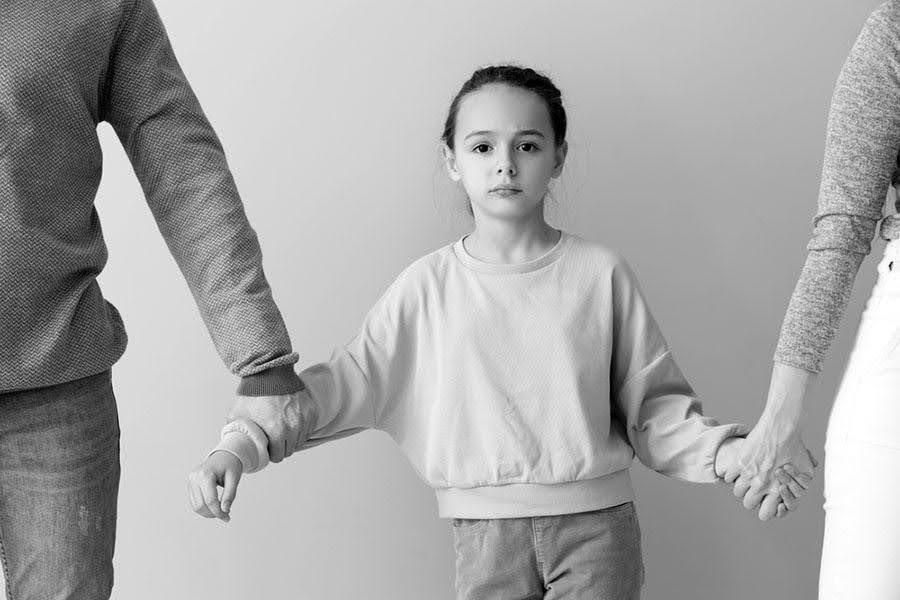Navigating family law matters amidst emotional turmoil can be overwhelming, especially regarding child custody. How is child custody determined in California? While the laws provide a framework, the process can be complex, with the court considering various factors to ensure the child’s best interests.
In this guide, we will examine the intricacies of this legal process, explaining the types of custody and the factors the court considers. Whether you are a parent going through a separation or simply seeking to understand the legal landscape, you will find valuable insights into the custody arrangements in the Golden State.

How Is Child Custody Determined in California?
Child custody is a complex legal matter that determines each parent’s rights and responsibilities in caring for their children before and after divorce. In California, the approach centers around one guiding principle – the best interests of the child.
This foundational standard ensures the child’s welfare and happiness are a priority in all custody decisions. It reflects the state’s commitment to fostering a healthy and stable environment for our youngest residents.
How does a judge determine child custody? While this guide can serve as a general guideline, seeking guidance from a reliable child custody law firm can give you valuable insights into these sensitive matters.
The type of custody arrangement
When discussing matters like custody, it is crucial to distinguish between two primary types – legal and physical custody. Legal custody involves the right to make significant decisions about the child’s life, including education, extracurricular activities, healthcare, travel, and religious upbringing.
In California, parents can share joint legal custody with the other parent, allowing both to participate in making essential decisions. If one parent gains sole legal custody, they have exclusive authority to make such decisions.
Physical custody refers to where the child will live and receive daily care. Similar to legal custody, physical custody can also be joint, allowing the child to spend substantial time with both parents. If one parent gains sole physical custody, the child primarily resides with them, while the other parent may have visitation rights.
Factors Considered in Child Custody Determination
If you are wondering how custody is determined in California, it is crucial to get familiar with the factors the courts take into account. These include:
- Welfare and health of the child – The child’s physical and emotional well-being is a primary concern
- Emotional ties between the parents – The strength and quality of the relationship between the child and each parent are evaluated
- Nature and amount of contact with both parents – The court assesses the level of involvement each parent has in the child’s life and given the circumstances believes it is in the best interest that both parents remain involved.
But who gets custody in California? California’s laws don’t favor one parent over the other; instead, they examine the contribution of each parent to their child’s life. The court may consider their reasonable preferences if the child is of sufficient age and maturity.
There is no age wherein the court must listen to the child’s preference but must be mature enough to express a preference regarding custody. Keep in mind, what the child thinks is best, may not be what the Judge thinks is best. Younger children may require more contact with their primary caregiver, while older children may have preferences that the court considers. Ultimately, the court’s primary focus is on the child’s best interests.
Best interest of the child standard
In California, the court takes into account the child’s best interests. The legal framework ensures a comprehensive evaluation of all relevant aspects of the child’s life and well-being. The California Family Code § 3011 outlines the standards for determining child custody, which include:
- The health, safety, and welfare of the child – The court takes into account any history of family abuse, evaluates the child’s home environment, and considers factors that might impact their physical and emotional well-being.
- The nature and amount of contact with both parents – The court assesses the relationship between the child and each parent. The objective is to promote frequent and continuing contact with both parents, provided it benefits the child’s welfare.
- Parental cooperation – The court evaluates the ability of each parent to cooperate, communicate, and foster a healthy co-parenting relationship.
- Any history of drug or alcohol abuse – A parent’s history of substance abuse significantly affects the custody decisions. This is particularly the case if it impacts their ability to take care of the child.
- The child’s ties to home, school, and community – Stability is crucial for a child’s development, so the court considers factors like housing and proximity to school. The judges also consider the child’s established connections with their current environment.

Parenting plan considerations
Creating a parenting plan after separation or divorce is a crucial step in the custody determination process. In some instances, the parents can agree on the arrangements independently, while others may need the court’s assistance.
A comprehensive parenting plan describes how the parents will take care of their children. It specifies living arrangements and parenting schedules, outlining the parent’s decision-making responsibilities. A detailed parenting plan typically includes the following elements:
- Visitation schedule – Detailed plans for weekends, holidays, and vacations.
- Decision-making protocols – Guidelines for how parents will make decisions regarding the child’s education, healthcare, and extracurricular activities.
- Communication guidelines – Rules for communication between parents and their children, ensuring transparency and maintaining healthy relationships.
- Dispute resolution – Mechanisms for resolving disagreements such as mediation or counseling. These resolution options aim to help parents handle conflicts constructively and maintain a stable environment for their children.
Special considerations and complex situations
Domestic violence and child custody
Domestic violence has a profound impact on custody decisions. If there is a history of domestic violence in the family, the judges use special laws to prioritize the safety of the child and the abused parent.
The application of these laws depends on the timing of the violence and whether the court was involved. If the parent was convicted of violence within the last five years, the California Code § 3044 applies. In such cases, the law presumes that granting custody to an abusive parent is not in the child’s best interests.
When one parent accuses another one of domestic violence, the judge must consider the allegations and decide what custody arrangements will best protect the child. The court may impose restrictions on visitations if there is evidence of violence. Legal protection for victims may include supervised visits, restraining orders, or other necessary measures to ensure the safety of the children.
Relocation and custody issues
Relocation poses unique challenges when it comes to child custody determination. When a parent wishes to move a child, they must provide notice to the other parent and may also need to seek court approval.
The court considers the reasons for the move and determines its impact on the child’s relationship with both parents. The primary consideration is whether the move is in the best interests of the child and how it will affect or interfere with the other parent’s relationship with the child.

Conclusion
How is child custody determined in California? This multifaceted process is guided by the best interests of the child. By examining various factors and parenting plans, the state ensures the child’s emotional, physical, and psychological needs are met.
The legal framework in this state strives to protect and nurture the well-being of the youngest residents. Understanding the laws and regulations related to legal processes such as child custody is crucial for safeguarding their future.




